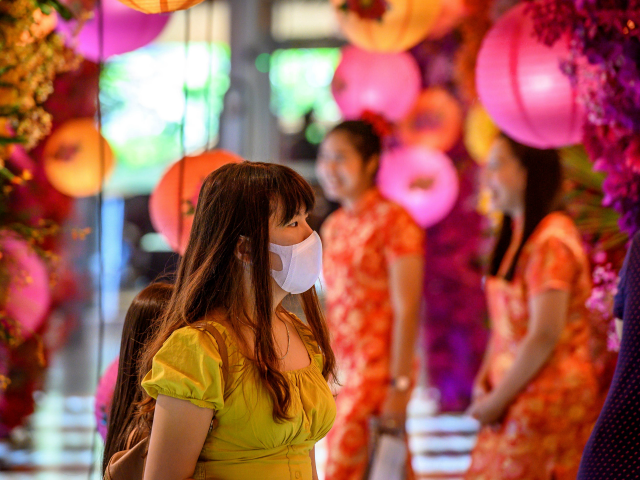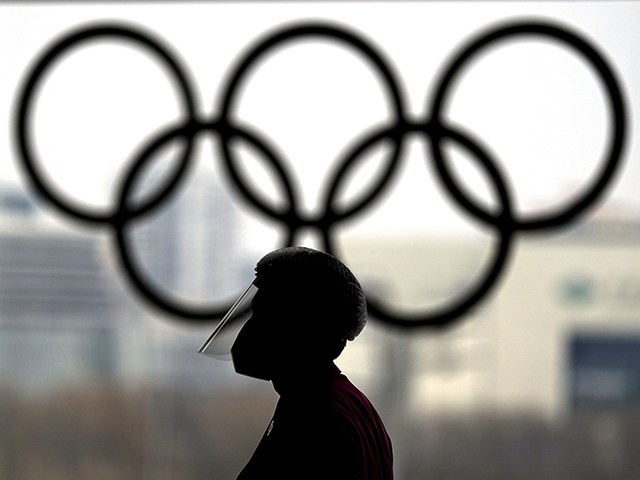The 2022 Winter Olympics — set to take place in Beijing from February 4 to February 20 — will “relieve anxieties felt about the pandemic,” China’s state-run Global Times claimed in an op-ed published Sunday, referring to the Chinese coronavirus pandemic, which originated in central China’s Wuhan city sometime in 2019.
“Against the backdrop of raging pandemic and slowing global economic recovery, the world needs a successful Winter Olympics, which can not only bring joy from watching the Games, relieving anxieties felt about the pandemic,” the newspaper wrote.
The publication failed to mention that the pandemic it referred to began as an epidemic in China, specifically within Wuhan, the capital of Hubei province. Much about the true origins of the Chinese coronavirus remains unknown, in large part due to Beijing’s efforts to hinder the World Health Organization (W.H.O.)’s official investigation into the disease’s emergence in Wuhan from January 14 to February 10, 2021. Currently available information indicates “COVID-19,” or the disease caused by a type of coronavirus called SARS-CoV-2, first appeared in Wuhan sometime in the autumn or winter of 2019. “COVID-19” is also known as the Chinese coronavirus.

The railway police are on duty in the waiting room on April 7, 2020, in Wuhan, Hubei Province, China. (Stringer/Getty Images)
Fueling the global spread of the disease, China’s ruling Communist Party allowed 5 million people to leave Wuhan in January 2020 before local officials locked down the city on the 23rd of that month to curb the transmission of the local epidemic beyond the community.

A woman with a face mask walks in a shop decorated for the Chinese Lunar New Year in Bangkok on January 24, 2020. (MLADEN ANTONOV/AFP via Getty Images)
“Escaping the outbreak may have been the cause for some people fleeing the city,” Business Insider speculated about Wuhan’s mass exodus at the time. “But it also coincided with the Lunar New Year, China’s most important holiday in which city workers return to their hometowns.”
Chinese Communist Party officials further allowed tens of thousands of people to gather for a Lunar New Year banquet in Wuhan on January 18, 2020, according to reports by the Straits Times and the Associated Press. Sharing food indoors is now known as one of the fastest ways the virus spreads in groups.
The Chinese Communist Party’s Public Security Bureau in Wuhan reprimanded a local ophthalmologist named Li Wenliang in January 2020 for attempting to warn his colleagues about the then-emerging novel coronavirus. Dr. Li later contracted the Chinese coronavirus and died from symptoms of the disease on February 7, 2020.
“On Dec 30, 2019, Li Wenliang sent a message to a group of fellow doctors warning them about a possible outbreak of an illness that resembled severe acute respiratory syndrome (SARS) in Wuhan, Hubei province, China, where he worked,” according to the Lancet.
“Meant to be a private message, he encouraged them to protect themselves from infection. Days later, he was summoned to the Public Security Bureau in Wuhan and made to sign a statement in which he was accused of making false statements that disturbed the public order,” the medical journal recalled.
Wuhan’s coronavirus epidemic spread beyond the city and caused a pandemic by March 11, 2020, that remains ongoing today. China’s coronavirus caseload experienced a resurgence in recent weeks, including in the national capital, Beijing. The phenomenon has caused concern among observers of the upcoming 2022 Winter Olympics, which Beijing is set to host from February 4 to February 20.
The Olympic organizing committee and Beijing attempted to create a separate “bubble” or “closed-loop” system for the Games meant to keep out Beijing’s and China’s coronavirus infections. This system has already proved a failure, with Beijing health officials announcing this week that they have detected “11 positive tests for COVID-19 [Chinese coronavirus] among 379 athletes and officials arriving Monday [January 31].”
“A total of 200 positive tests for COVID-19 [Chinese coronavirus] have now been recorded at the Olympics since Jan. 23.,” Time magazine reported on February 1. “Of those 200, 67 were athletes and officials. ‘Stakeholders’ accounted for the other 133.”
Time defined Olympic “stakeholders” as “a group which includes workers and media.”
The rocky start to the 2022 Winter Olympics includes a Western-led “boycott” of the Games’ setting in Beijing. The governments of the U.S., Britain, Australia, and Canada have all expressed desires or intentions to diplomatically boycott the games due to China’s myriad human rights violations in Hong Kong and Xinjiang, though Beijing has claimed that no U.S. or Australian government officials were actually invited to the event.

COMMENTS
Please let us know if you're having issues with commenting.